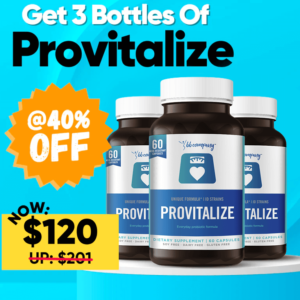Advertising Sponsored by BB Company, Makers of Provitalize and Slim Gut
How To Get Rid Of Bloating: Your Guide to Easy Relief

Bloating can be an uncomfortable and often frustrating experience, especially when it seems to occur without any obvious reason. After all, it’s not very pleasant to walk around daily feeling like your belly is protruding or like you can’t eat freely.
While having a bloated stomach is a digestive issue that many people deal with, it’s not always easy to pinpoint the underlying causes of bloating or to permanently solve it. If this all sounds familiar, you’re probably wondering, why am I so bloated all the time?
In this article, we’ll explore the reasons you may be bloated frequently (especially after you enter your 40s or 50s – hint: it could be “hormonal bloating”), plus offer tips for how to stop bloating and keep it from returning.
Your Guide To Managing Bloating
What Causes Bloating?
Bloating1 can be the result of various factors—ranging from what you eat to your genetics, hormone levels, or even because of medications you’ve recently taken.2
For many women, bloating after eating is a frequent complaint.
This uncomfortable sensation tends to worsen around menopause, when women’s digestive system becomes susceptible to changes caused by hormonal changes.3
Are Hormonal Imbalance To Blame?

As the body goes through hormonal changes, the resulting imbalance in hormones can result in fluid retention & gastrointestinal motility.
This may cause an uptick in constipation, and in some cases, hormonal bloating.4
Hormonal bloating is very common in women experiencing hormonal changes, such as perimenopause and menopause.
Here’s what you need to know about hormonal bloating:
- Caused by hormonal changes like Premenstrual Syndrome (PMS), Perimenopause & Menopause.
- Influences fluid retention and affects gastrointestinal motility.
- Causes swelling & a “feeling of fullness” in the abdominal area.
- Lasts for hours, usually after meals.
What Else Can Cause Bloating?
Aside from hormones affecting a woman’s digestion, other factors can also cause bloating.
Common causes of bloating include:5
Consuming high-sodium foods, carbonated drinks, and certain carbohydrates that are hard to digest (like lactose in milk) can lead to increased gas and stomach bloating.
Eating fried foods, fast food, or packaged foods that are high in fat, sugar, and salt can slow down digestion and trigger a feeling of fullness that lasts longer than is comfortable. Additionally, eating too quickly and not drinking enough water contributes to that bloated feeling among some women.
Not only can your GI tract react negatively to specific things that you eat, but even the way that you eat (such as how fast) and the combination of foods you eat together might trigger bloating. Eating too quickly, not chewing food thoroughly, or talking while eating can cause you to swallow air, contributing to bloating.
Sensitivities to lactose, gluten, and other food allergens can cause excessive gas production and bloating in some people.
Difficulty with bowel movements, such as passing bowel movements less than 3 to 4 times per week, can cause bloating and a feeling of fullness in the abdomen.6
This disorder is characterized by a range of digestive issues, such as diarrhea, constipation, gas, and bloating. Many people with IBS struggle to digest FODMAP foods well, which are foods that contain certain types of carbohydrates that can be hard to properly break down and can cause gas accumulation.
Large meals (especially those high in fat, salt, and sugars) can stretch the stomach and lead to temporary bloating.
Sorbitol and xylitol, found in products like sugar-free gums and candies, can cause bloating in some individuals.
Inadequate water intake can lead to constipation and bloating. For example, drinking alcohol can throw off your fluid levels, cause you to become dehydrated, and lead to your digestive system feeling sluggish and bloated.
A sedentary lifestyle can slow down digestion, causing a lack of appetite that also coincides with a bloated belly.
High levels of stress can affect the nerves of the digestive system, contributing to various GI problems.
Bacterial overgrowth or infections such as SIBO disrupt the normal balance of gut bacteria, causing gas and digestive discomfort.
Certain medications, such as aspirin, antacids, or blood pressure drugs, are capable of triggering bloating as a side effect.
How to Stop Bloating: Lifestyle and Dietary Tweaks

To address a bloated stomach, women can consider these lifestyle and dietary changes:
Slow down your eating pace to give your body time to signal fullness; this way, you can control how much you eat and make healthier choices. Mindfully eating can also reduce the amount of air you swallow.
Focus on a fiber-rich diet to help regulate digestion and support hormonal balance. However, introduce high-fiber foods gradually to allow your body to adjust.
If you find that a high-fiber diet causes too much bloating, consider removing FODMAP foods from your diet (like beans, wheat, cruciferous veggies, and some fruit). You can remove FODMAPs by trying an “elimination diet.” Also, make sure to drink lots of water which helps fiber do its job of preventing constipation.
Eating smaller, more frequent meals helps maintain a steady flow through your digestive system without overloading it. While this approach works best for most people, some prefer to try intermittent fasting instead, in which they eat only once or twice per day. Experiment to see what type of eating schedule works best for you.
Drink plenty of water throughout the day to help food pass through the digestive system and reduce the likelihood of constipation. However, avoid sugary and carbonated drinks that can make bloating worse.
Movement can help stimulate the passage of gas through the digestive tract and reduce constipation. Exercise is also helpful for maintaining a healthy weight and for managing stress which can disrupt digestive function.
What Relieves Bloating Fast?

The truth is that getting bloating under control often requires some patience and consistency.
However, there are certain supplements have been shown to support women’s digestive health, which helps keep bloating to a minimum.
These supplements stand a better chance at helping you stay bloat-free because they’re more geared towards transforming your gut for the long term, unlike quick fixes which may cease to work after a few hours.
Here at Supplement Review, we’ve analyzed some of the top-selling anti-bloating supplements on the market to help guide you in the right direction.
We’ll show you what to look for and what to avoid in a high-quality supplement, plus our top 5 picks of the year.
Most Popular Supplements To Make Bloating Go Away
(Especially for Women Over 30)
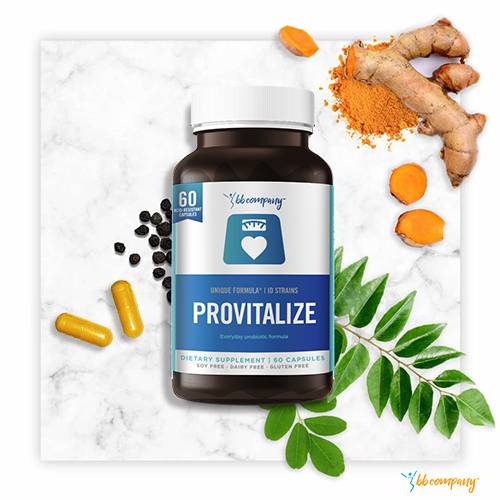
This is an anti-bloating probiotic that contains unique strains B. Lactis, B. Breve, and L. Gasseri, proven in multiple clinical trials to alleviate gas and bloating and improve digestive health.
What I like about it is that it also contains a powerful herbal blend of moringa curry, and turmeric leaf extracts (a phytoestrogen) with proven anti-inflammatory and digestive benefits to support healthy estrogen levels, which makes it especially effective for women like us. Most supplements either don’t include these natural ingredients, or they focus on addressing the symptoms but not the cause of bloating. Finally, Provitalize also includes Bioperene (black pepper extract) and sunflower lecithin. These ingredients enhance absorption of vitamins, minerals, and other beneficial properties of herbal formulas.
Most people see less bloating in just a few days and they start to notice a flatter tummy (bye bye bloat!) in less than 2 weeks.
Pros
- FDA, GMP, and Certified Organic
- Vegan, keto, paleo friendly
- 100% natural, safe ingredients
- Thermogenic herbal assisted probiotic formula
- 12,989 Amazon reviewers report 84% positive results
- 4.1 Star Trustpilot rating
- 62 Billion CFUs
- Clinically proven probiotic strains
- Vegan DR Caps™ ensure the probiotics reach your gut safely
- Independently verified by Eurofins Testing Laboratory
- 90 day money-back guarantee
Cons
- No free trial
- This is a premium supplement with a premium price to match.
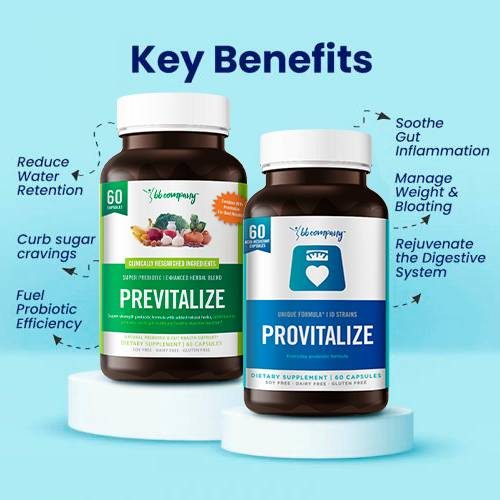
We listed the Slim Gut bundle second because it costs slightly more than Provitalize alone, but we believe it is a better value.
Get all the benefits of Provitalize, plus Previtalize. Previtalize is a prebiotic blend that increases the likelihood of beneficial probiotics in Provitalize colonizing your gut. Previtalize contains healthy plant fiber probiotics need to thrive including, fructooligosaccharides, galactooligosaccharides, xylooligosaccharides, inulin, and burdock root.
Burdock root reduces water retention and bloating.
Galactooligosaccharides are shown to reduce bloating and improve symptoms of IBS5.
Xylooligosaccharides stimulate probiotic growth at lower doses helping to avoid the initial normalizing phase6 and boost the speed in which you experience improved digestive health.
According to a survey of over 10,000 customers, 3 in 5 saw sustained improvements in bloating symptoms after 30 days. We think this is an impressive result because not everyone tried Provitalize and Previtalize to improve their bloating symptoms, and these customer-reported results are better than what we have seen from some of the popular temporary bloat relief products in the market
Pros
- FDA, GMP, and Certified Organic
- Vegan, keto, paleo friendly
- 100% natural, safe ingredients
- Thermogenic herbal assisted probiotic formula
- 12,989 Amazon reviewers report 84% positive results
- 4 Star Trustpilot rating
- 62 Billion CFU
- Clinically proven probiotic strains
- Clinically studied prebiotics
- Vegan DR CapsTM ensure the probiotics reach your gut safely
- Independently verified by Eurofins Testing Laboratory
- 90 day money-back guarantee
Cons
- No free trial
- Slightly more expensive than Provitalize alone.
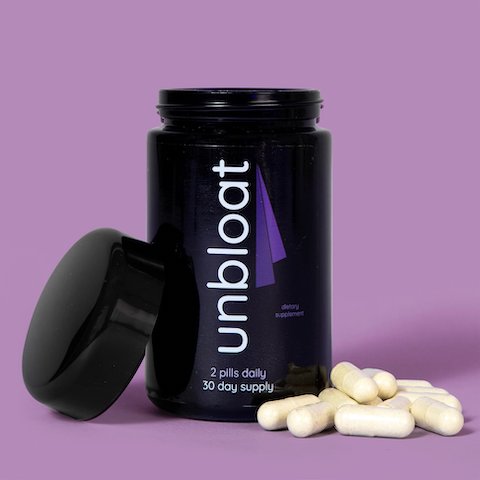
As far as digestive enzymes for a fast temporary remedy to gas and bloating assuming you have an enzyme deficiency, Unbloat is one of the better products available.
Unbloat contains full-spectrum enzymes for breaking down fats, carbohydrates, proteins, fiber, and dairy. Most digestive enzyme products contain only protease, amylase, and lipase. Unbloat includes additional enzymes for breaking down fiber and lactose.
Pros
- Non GMO Certified
- Gluten free
- Clean verified
- No artificial colors or sweeteners
- 59% five-star Amazon reviews
- Inexpensive
- 30 day guarantee
Cons
- Temporary solution
- Does not improve overall digestive health long-term
- Must be taken before every meal
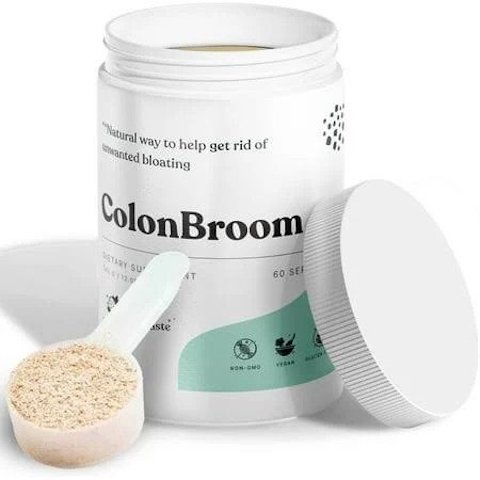
Colon Broom supports overall digestive health and is a good complement to the above products.
Colon Broom uses psyllium husk. Psyllium husk swells when combined with water to produce more bulk which stimulates the intestines to pass waste products through the digestive tract.
When taken with a probiotic formula like Provitalize, Colon Broom helps alleviate gas, bloating, and constipation and improve regularity of bowel movements.
May also support weight loss.
Pros
- FDA and GMP Approved
- Sugar-free
- 51% five-star Amazon reviews
Cons
- 14 day money-back guarantee only
- May interfere with medications
- Not recommended for IBS-D sufferers
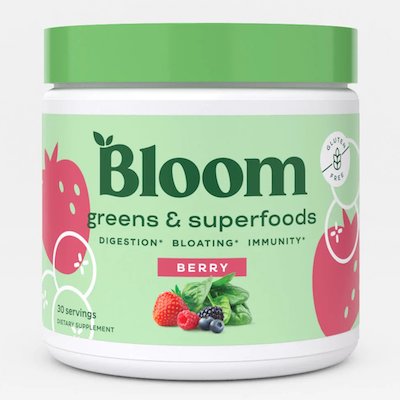
Bloom Greens & Superfoods is a powder juice and smoothie mix that aims to provide your body with missing micronutrients on a daily basis. It contains many ingredients in small quantities, including blends of fruits, vegetables, antioxidants, digestive enzymes, probiotics, prebiotics, fiber, and adaptogens.
It is not clear which ingredients help with bloating, but Bloom Nutrition believes its probiotic blend restores the balance to your gut and that helps to eliminate bloat. We combed through 14,000+ good reviews on Amazon and found ~10% who cited improvements in bloating. For this reason, we ranked Bloom Nutrition as #5 to round up our list.
Pros
- Free Shipping in the US above $50
- 67% 5-star rating on Amazon
- Produced in a cGMP facility
Cons
- No money-back guarantee and returns must be paid for by the customer and received within 15 days to qualify for a refund
- Few reviews on TrustPilot
If you’re a woman, especially if you’re experiencing hormonal change, managing a bloated stomach often requires a holistic approach. It’s not just about what you eat or the supplements you take; it’s also about how mindfully you approach your diet, your exercise and sleep habits, how stressed you feel, and generally how you live.
While bloating can be a nuisance, it doesn’t have to control your life. Understanding what causes bloating in women and taking proactive steps to manage it can make a significant difference.

Jillian is an experienced health and personal development content writer with 10 years of experience, as well as a Certified Holistic Health Coach and Certified Yoga Instructor. For the past decade, she has been writing and editing high-quality articles and blog posts that engage, inform and educate readers about the health and wellness sphere.






